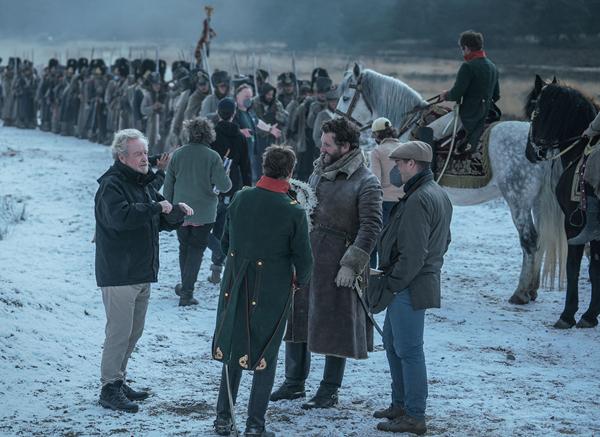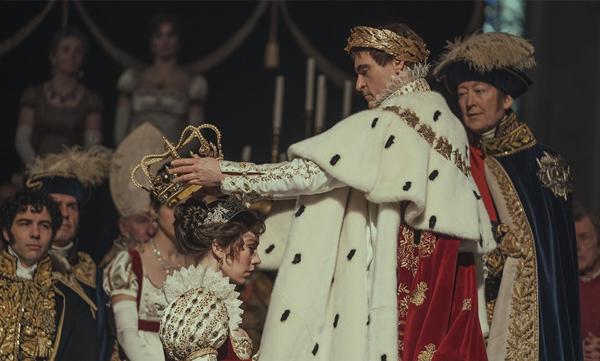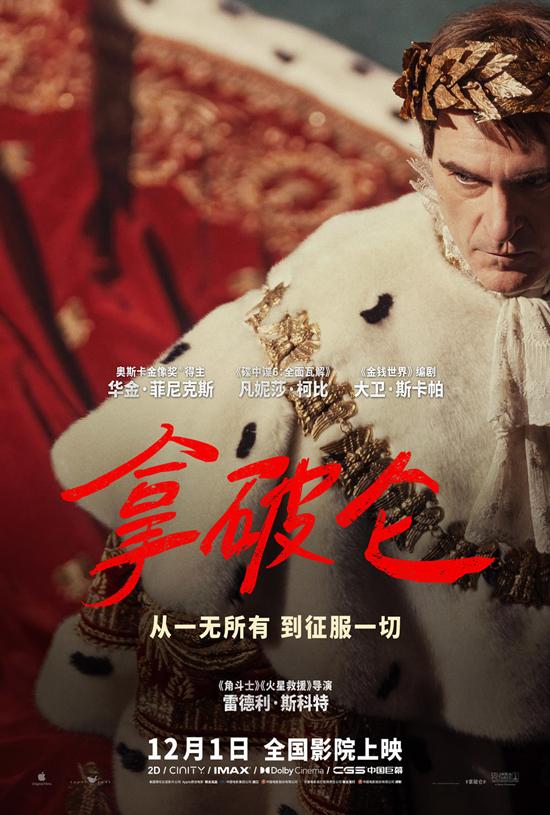
When faced with negative reviews regarding his portrayal of Napoleon Bonaparte, director Ridley Scott simply shrugged off the French critics who have labeled the film as "Barbie and Ken under the

Director Ridley Scott directing on the set of "Napoleon." [Photo courtesy of Sony Pictures Entertainment]
However, Scott adopted a lighter tone when addressing his Chinese audience, recording a video greeting, saying: "Hey, friends in China. I'm Ridley Scott. I'm so excited to know 'Napoleon' will be coming to cinemas in China on Dec. 1."
Continuing his message, Scott emphasized the immersive experience the film offers, stating, "In this movie, you're about to witness some of the most famous battles in French history with war scenes so intense and realistic, you'll feel like you're right there on the battlefield."
As the first Hollywood production to enter the Chinese market in December, "Napoleon" is a spectacle-filled action epic that chronicles the tumultuous rise and fall of Napoleon Bonaparte, portrayed by Oscar-winner Joaquin Phoenix. Set against a breathtaking backdrop of grand filmmaking orchestrated by Scott, the movie portrays Bonaparte's unwavering quest for power, framed within his captivating yet volatile relationship with his one true love, Joséphine de Beauharnais. The film highlights his visionary military and political strategies through some of the most dynamic practical battle sequences ever captured on film, as the movie recreates Napoleon's famous battles — Toulon, Austerlitz, Waterloo, and more — featuring an enormous cast of actors trained to fight like soldiers of the time.

Joaquin Phoenix as Napoleon Bonaparte and Vanessa Kirby as Empress Joséphine in a still image from "Napoleon." [Photo courtesy of Sony Pictures Entertainment]
The French emperor, one of the greatest military leaders of all time, elicits both criticism and admiration for his rise to power and his harsh, strategic military campaigns. His influence extends from Winston Churchill to Friedrich Nietzsche. Ruthless in war, a tyrant in his country, but also a liberator who came from humble beginnings, he shows that a talent for leadership can arise from any class. Napoleon's battlefield success became legend, necessitating seven European coalitions to finally defeat him.
As well as reuniting with his various heads of departments and several past award-winning collaborators, the film also reunites Scott with Joaquin Phoenix, who played Commodus in "Gladiator," after 23 years. For Scott, it was seeing Phoenix's Oscar-winning performance in "Joker" that reminded him of their collaboration on "Gladiator," and he knew that he would be perfect for the role.
"He's the only actor where we talk for weeks beforehand, just chatting and arguing in an office over aspects of the character. At the end, we are on the same page," said Scott. "He's good for me because he keeps me honest, and I'm good for him because I keep him in line. Physically, he's perfect for the role — some of his facial features are strikingly similar to Napoleon's."
Admitting his initial lack of knowledge about Napoleon, Phoenix highlighted Scott's meticulous preparation, which provided the actors with the freedom to explore their roles on set.

A still image of a grand battle scene from "Napoleon." [Photo courtesy of Sony Pictures Entertainment]
Scott's fascination with Napoleon and the era dates back to his early career, with his first motion picture, "The Duellists" (1977), set in Napoleonic times. For a man who has directed such classics as "Gladiator," "Alien," "Blade Runner" and "Black Hawk Down," the story is one he has wanted to bring to the screen for many years. "I have a preference for historical drama, because history is so interesting," Scott said. "Napoleonic history is the beginning of modern history. He changed the world; he rewrote the rulebook."
The director is drawn to Napoleon's complexity, both as a military genius and a man imprisoned by his own heart and emotions. Scott described his intrigue, saying, "Apart from him being an incredible strategist, a marvelous, intuitive — and merciless — politician, I was fascinated with how a man like this — who's on his way to take Moscow — could be obsessed with what his wife is doing back in Paris."
Vanessa Kirby, known to many movie fans in China for her role in "Mission: Impossible — Dead Reckoning," portrayed the role of Empress Joséphine with confidence and sensuality, but what's great is her humor, Scott revealed. She's got a "great sense of humor and a very natural intuitive sense of timing" that set her apart and made her an interesting, striking match opposite Phoenix.

A still image of Napoleon and Joséphine in an intimate moment from "Napoleon." [Photo courtesy of Sony Pictures Entertainment]
The chemistry between the actors adds layers to the film, breathing life into the tempestuous relationship portrayed in David Scarpa's screenplay. Scott explained the multifaceted nature of the story, stating, "He ends up sniveling in tears — the man we have seen command his way to the throne of Europe, the tactical genius, turned into this little helpless man, who is completely in love with the woman next to him on his couch, admitting he is nothing without her. His letters to her are comically rude and juvenile, overly romantic and even quite dirty. He was absolutely enchanted by her."
"Napoleon" presents an epic scale rarely seen in contemporary cinema, as noted by producer Mark Huffam, who has collaborated with Scott on multiple projects. Huffam emphasized the need for a director of Scott's caliber to tackle a film of this nature practically, emphasizing the vision, tenacity, skill and experience required for such a grand production.
"There just aren't many directors in the world that have the knowledge and experience to make this kind of film, and doing it as practically — in-camera — as possible," Huffam said.

A Chinese promotional poster for "Napoleon." [Image courtesy of Sony Pictures Entertainment]
As Scott turns 86, his fascination with Napoleon remains strong, with the film serving as a culmination of his career-long interest in the French emperor. Reflecting on his journey, Scott mused, "History's very interesting because we don't learn from all of our mistakes."
